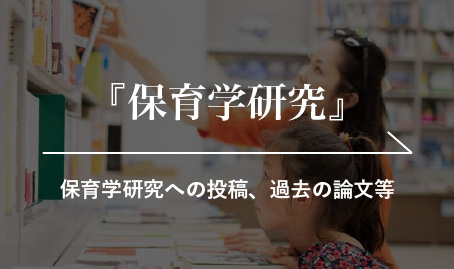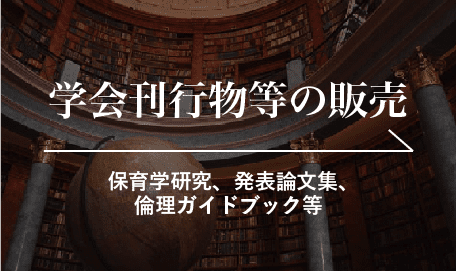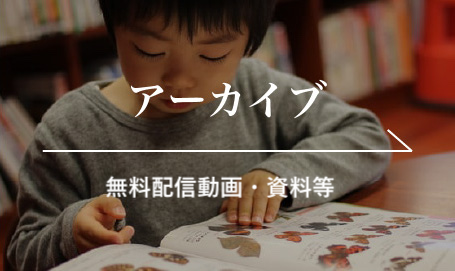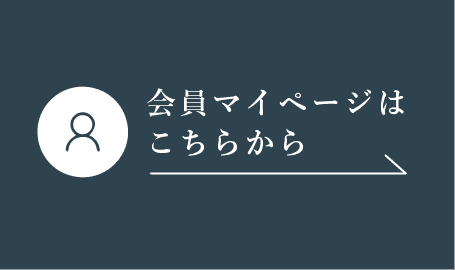< VOLUME 56, No.1 >
Mika Ikemoto Future Trend of Monitoring Quality in Early Childhood Education and Care:
The Value of a Centralized Monitoring System
Research on Early Childhood Care and Education in Japan, 2018, 56(1), 11-20.
As childcare facilities are rapidly increasing, there is concern that the quality of education and care will decline.In this paper, considering overseas trend, we examined how to reform the monitoring system of childcare quality in Japan.
We are aiming to secure quality by locating qualified staff and on-site examinations of local governments,but childcare staffs are in short supply. Local governments where childcare facilities are rapidly increasing have caused practical examination rates to reduce. Overseas, every facility must be monitored regularly by national institution and the results of monitoring are open to the public. In addition, children and parents often participate in monitoring quality. Even in Japan, establishing national institution for monitoring early childhood education and care, and encouraging parents and children to participate in monitoring quality are expected.
Keywords: monitoring; quality in early childhood education and care, participation by children and parents
-------------
< VOLUME 56, No.1 >
Manabu Kawata Assessing Early Childhood Education and Care as an Ecological System
Research on Early Childhood Care and Education in Japan, 2018, 56(1), 21-32.
The purpose of this study is to examine the principles for assessment of early childhood education and care from a psychological perspective. Based on Vygotskian approaches, we adopted two concepts, or unit of analysis, namely, “triangle of play” and “guided participation” (by Rogoff ) to assess the development of children’s play activities and teachers’ interventions. Two practical cases with a varying degree of pedagogical and ecological contents were analyzed using these 2 units of analysis. The results revealed the progression / development in play through “triangle of play”. And, there is a possibility that both cases share a common childcare process from the perspective of “guided participation”.
Key Word:assessment, unit of analysis, ecology, triangle of play, guided participation
-------------
< VOLUME 56, No.1 >
Fumiharu Yamagata A Study of the Evaluation of the Early Child Care and Education System and Practice from a Viewpoint of Social Welfare
Research on Early Childhood Care and Education in Japan, 2018, 56(1), 33-43.
The early child care and education system is public and professional practice. Therefore it is necessary to be eval- uated from viewpoint of quality control and enhancement, and accountability to the users and the public. From the past, social work has emphasized assessment and evaluation about its practice. After the social welfare basic structural reforms, evaluation came to be called for from a viewpoint of accountability. Evaluation about the prac- tice of early child care and education is included in the revised day care center guidelines and the revised course of study for kindergarten. But the accountability to the public isn’t included in them. It is necessary to promote the evaluation by third parties based on their own evaluation and the user evaluation, and to disclose the results.
Key Word: assessment, evaluation, evaluation by third parties, accountability, quality control and enhancement
-------------
< VOLUME 56, No.1 >
Mariko Sadayuki On the Evaluation of Early Childhood Education and Care from the Viewpoint of Architecture
Research on Early Childhood Care and Education in Japan, 2018, 56(1), 44-55.
The purpose of this paper is to evaluate early childhood education and care from the viewpoint of architecture. Child care facilities are places where children learn their basic living styles through living and playing with teach- ers and other children. The author believes the facilities should satisfy three points: to protect children’s safety perfectly; to ensure the required physical environments such as sufficient spaces, fresh air, comfortable temperature and calmness; and to embody the facility’s philosophy and principles in its programs. The stakeholders involved in child care, including teachers, parents, architects, facility managers and officials of local public, should cooperate, recognize problems based on the above three architectural points and solve them.
Key Word: architecture, early childhood education and care, evaluation, building standards act, physical ironments
-------------
< VOLUME 56, No.1 >
Yuki Iino Study on the Development of ‘Quality Assurance’ and ‘Quality Evaluation/
Assessment’ in New Zealand Early Childhood Education Policy:
Focusing on the Twenty Years that Have Passed since Te Whāriki
Research on Early Childhood Care and Education in Japan, 2018, 56(1), 56-67.
New Zealand has been internationally recognized in the past twenty-five years as a particularly productive area of discourses in early childhood education. Te Whāriki, an early childhood curriculum framework, lies at the root of contemporary narrative assessment practices, and the concept of learning stories. This research focuses on the 20 years since Te Whāriki was published, and examines how "Quality Assurance" and "Quality Evaluation/ Assessment" were developed as a policy of early childhood education by the New Zealand government. Further- more, the way in which the child’s "learning" was placed has been examined. The result of the research has been a strong focus on a knowledge economy and committed leaders who have tirelessly advocated a defined vision for the sector, thereby challenging the governing system.
Key Word: Te Whāriki, quality assurance, quality evaluation/assessment, learning, New Zealand
-------------
< VOLUME 56, No.1 >
Reiko Uzuhashi Foreign Quality Rating Scales’ Best Practice in Japan
Research on Early Childhood Care and Education in Japan, 2018, 56(1), 68-78.
Some foreign rating scales are used to evaluate the quality of ECEC provision in Japan; ECERS/ITERS, SICS, SSTEW, and ECERS-E. Except SICS these have same structure and scoring system, which means that they are divided into subscales and items and then scored in each item against a seven-point scale. ECERS is designed for evaluating provision for ages 3-5 and ITERS is for ages 0-2, offering a broad snapshot. ECERS-E, which is for pre-school children, focuses on its academic aspects. SSTEW is for ages 2-5, and focuses on teaching and learning. These four scales could be used for program improvement and research. SICS has been moderated as a tool of self-evaluation for use in Japan. It is necessary to refer in detail to Japanese government guidelines for ECEC provisions.
Key Word:ECERS, SSTEW, SICS, quality improvement, rating scale
-------------
< VOLUME 56, No.1 >
Hanako Senoo and Miki Yuzawa An Evaluation of the Quality of Early Years Provision (Early Childhood Education and Care) through School Inspections in England:The Current Status and Issues as Seen via an Exploration of Practitioners (Teachers of ECEC)’ Perspectives
Research on Early Childhood Care and Education in Japan, 2018, 56(1), 79-90.
A non-ministerial government department, the Office for Standards in Education, Children’s Services and Skills (Ofsted), has jurisdiction over the implementation of school inspections in the education system in England. This article aims to provide basic information on the inspection framework within the early years system context and evaluate its implementation via semi-structured interviews with five early years practitioners (teachers of ECEC) in two nursery schools evaluated as outstanding to identify the current status and leading issues. Three overarching themes emerged: 1) perception and attitudes towards inspection results; 2) feeling constantly under surveillance; 3) need for constant year on year pupil improvement and progress. Although they narrated the dilemmas encountered and their ambivalent feelings towards the inspection, it is suggested that their skills of self-evaluation might be enhanced through the inspections.
Key Word: early childhood education and care, England, Ofsted, school inspection,practitioners (teachers of ECEC)’ perspectives
-------------
< VOLUME 56, No.1 >
Hiroo Matsumoto, Hiromi Nishiu, Mina Taniguchi, Motoko Kataoka and Gota Matsui Capturing and Improving the Quality of Play in Early Childhood Education and Care Settings through Formative Assessment
Research on Early Childhood Care and Education in Japan, 2018, 56(1), 91-102.
This study examines the effectiveness of formative assessment methods in order to improve the quality of play in early childhood education and care (ECEC) . We created and displayed daily class reports entitled “Newspaper” for the children and analyzed the influences of “Newspaper” on the children’s play behaviors through action research. Our study clarified the following three points: first, giving the feedback to all of the children put them at ease, especially the three-year-olds. Secondly, recalling and reflecting their play through “Newspaper” triggered children to come up with new ways to play. Lastly, they selected new places to play in, “Newspaper” having also facilitated communication among the children.
Key Word:quality of play, formative assessment, young children, action research
-------------









